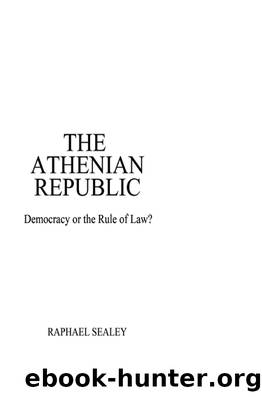The Athenian Republic by Sealey Raphael

Author:Sealey, Raphael.
Language: eng
Format: epub
Publisher: Pennsylvania State University Press
II
The word dÄmokratia and words related to it by similarity or contrast are only a small part of Athenian public life, but scrutiny of them must rely on utterances of historians and orators. By the time of Thucydides and of Pseudo-Xenophon political utterance balanced dÄmokratia and oligarchia as contrasting terms.18 Whatever the connotative meaning, oligarchia clung by denotation to Lakedaimon.19 DÄmokratia clung by denotation to Athens. In the Thucydidean funeral speech (2.37.1) Perikles says that the Athenian constitution is called in name dÄmokratia The use of the word by a pleader in court in 419/18 is, if possible, even more telling. He says that as a member of the council of five hundred he offered sacrifice and prayers âon behalf of this cityâ and as a member of the first prytany of the year he offered sacrifice âon behalf of the dÄmokratiaâ.20 The latter passage shows that as early as 419/18 the word dÄmokratia could be used as a colorless designation for the current condition of the Athenians.
In other early occurrences the word is not colorless. Herodotos (3.80â83) gives an account of a supposed debate between three Persian grandees on forms of government. One of them, Otanes, argues against setting up a mounarchos and urges instead that they should bring about the rule of the multitude (plÄthos). Herodotos elsewhere (6.43.3) refers to the proposal of Otanes as a proposal for dÄmokratia The other two grandees, Megabyxos (3.81.2â3) and Dareios (3.82.1 and 4â5), utter the word dÄmos to characterize the proposal of Otanes. But Otanes himself does not use dÄmokratia or dÄmos of his proposal. On the contrary he says (3.80.6): âThe rule of the multitude has in the first place the most beautiful name of all, isonomia.â He proceeds to contrast that condition with the arbitrary behavior of a tyrant.
Toward understanding the choice of words by Otanes one must pursue isonomia and Herodotean usage of dÄmokratia a little further. Previous studies have shown that isonomia is ânot a name for a form of government but for the principle of political equality.â21 The force of the word is clearly apparent in the drinking song in honor of the tyrannicides. Harmodios and Aristogeiton killed the tyrant Hipparchos and made Athens isonomoi.22 Isonomia contrasts with dynasteia.23 Herodotos (3.142.3) makes Maiandrios tell the assembled Samians that he disapproves of the rule of one man and that accordingly he is giving up his own rule and proclaiming isonomia In the same sense Herodotos (5.37.2) tells of the first action taken by Aristagoras of Miletos, when he launched the Ionian Revolt: âIn the first place in name he gave up his tyranny and created isonomia for Miletos.â Someone less devoted to isonomia, a tyrant for example, might prefer a less attractive word. At the Danube Histiaios persuaded his fellow-tyrants to resist the blandishments of the Skythians and preserve the bridge for Dareios. He argued that the tyrants owed their rule to Dareios and would be overthrown if the power of Dareios collapsed; âfor, he said, each of the cities would rather have dÄmokratia than tyrannyâ (4.
Download
This site does not store any files on its server. We only index and link to content provided by other sites. Please contact the content providers to delete copyright contents if any and email us, we'll remove relevant links or contents immediately.
| Africa | Americas |
| Arctic & Antarctica | Asia |
| Australia & Oceania | Europe |
| Middle East | Russia |
| United States | World |
| Ancient Civilizations | Military |
| Historical Study & Educational Resources |
The Daily Stoic by Holiday Ryan & Hanselman Stephen(2706)
The Fate of Rome: Climate, Disease, and the End of an Empire (The Princeton History of the Ancient World) by Kyle Harper(2434)
People of the Earth: An Introduction to World Prehistory by Dr. Brian Fagan & Nadia Durrani(2346)
Ancient Worlds by Michael Scott(2102)
Babylon's Ark by Lawrence Anthony(2069)
Foreign Devils on the Silk Road: The Search for the Lost Treasures of Central Asia by Peter Hopkirk(2055)
India's Ancient Past by R.S. Sharma(1984)
MOSES THE EGYPTIAN by Jan Assmann(1970)
The Complete Dead Sea Scrolls in English (7th Edition) (Penguin Classics) by Geza Vermes(1839)
Lost Technologies of Ancient Egypt by Christopher Dunn(1797)
The Daily Stoic by Ryan Holiday & Stephen Hanselman(1767)
The Earth Chronicles Handbook by Zecharia Sitchin(1743)
24 Hours in Ancient Rome by Philip Matyszak(1676)
Alexander the Great by Philip Freeman(1645)
Aztec by Gary Jennings(1543)
The Nine Waves of Creation by Carl Johan Calleman(1519)
Curse Tablets and Binding Spells from the Ancient World by Gager John G.;(1510)
Before Atlantis by Frank Joseph(1483)
Earthmare: The Lost Book of Wars by Cergat(1466)
